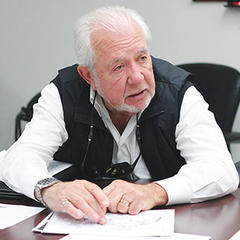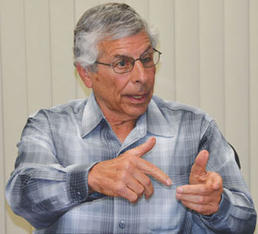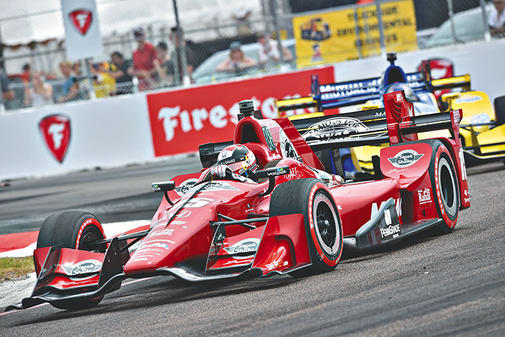It was Memorial Day weekend 1973 and Chris Pook, a 32-year-old, Engish-born travel agent, who had arrived in the U.S. 10 years earlier with a sales and marketing degree in hand from the University of London, was sitting in his office with a view of the Queen Mary watching the Indy 500 on the telly. He thought, “Why not a Monaco-style race on the streets of Long Beach?” Thus began a nearly 15-month journey to convince city, state and car-racing officials to give Pook the green light for a Formula One race through the city’s downtown streets. Jim Michaelian became one of Pook’s first hires for the newly-formed Grand Prix Association of Long Beach (GPALB).

Chris Pook (Photograph by the Business Journal’s Brandon Richardson)
On September 28, 1975, a Formula 5000 “test” race was run, marking the begining of a decades-long working relationship and friendship between Pook and Michaelian. More than 25 years later, when Pook left the association he started, it was Michaelian who was named to replace him – and there he remains.
By any measure, the Toyota Grand Prix of Long Beach has been a huge success and long ago was fully embraced by the community. At 43 consecutive years, it is the longest-running street race in the U.S. It is the city’s largest event. It provides the city more free TV time than any other event. It is in the black. The city is reimbursed fully for the services it provides.

Jim Michaelian (Photograph by the Business Journal’s Larry Duncan)
Today, the men’s relationship is strained. Pook wants to return Formula One to Long Beach, where it hasn’t raced since he switched to IndyCar with the 1984 race.
When Long Beach city officials decided to review all aspects of the annual event and issue a request for proposals, only two were received: one from Pook’s World Automobile Championship of California; the other from Michaelian and the GPALB. The city council contracted with KPMG two days after the 2017 race to analyze the proposals. John Keisler, director of the city’s economic and property development department, told the Business Journal, “We hope the KPMG study will allow staff to make a recommendation [to the city council] in July.”
One thing to look for in the study is if KPMG is able to confirm Pook’s claims or reaffirm Michaelian’s assertions.
The Business Journal sat down with Pook and Michaelian, separately, for in depth interviews. What follows is an inside look at the proposals and the men – in their own words.
To read the full interviews, click here.

